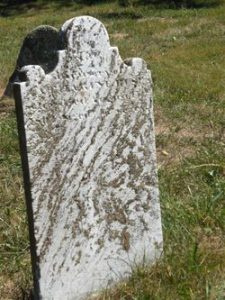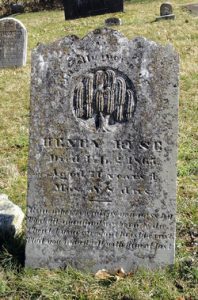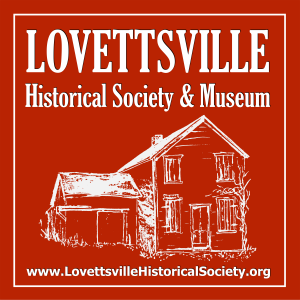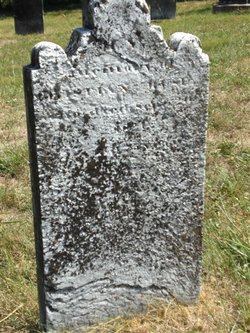By Edward Spannaus
Christian Gottlieb Ruse (1746 – 1821) and Anna Catherine Ruse (1756? – 1802) came to our attention some years ago, because they were early owners of the land on which the Lovettsville Community Park was to be constructed. Their story is more-or-less typical of the German families who settled here in the colonial, pre-Revolutionary period, and is thus of general interest for a study of the German Settlement in Loudoun County.
Christian may have been farming that land where the park now is, as early 1769, when his name first appears on the Loudoun County Tithable (tax) list. Almost a quarter of a century later, in 1793, he formally leased that land. He was able to purchase it in 1803, and it stayed in his family for decades.
We know little of the Ruse family history prior to 1765. Much of the difficulty in tracing German immigrant families in the 18th century is the multiple variations in spelling (in this case) Reuss, Russ, LeRew, LeRoux, etc.), and the lack of records overall.
In 1765, four years before he appears in Loudoun County, Christian Ruse was naturalized in Frederick, Maryland. The naturalization list names “Roos, Christian, of Frederick County, German” as being naturalized on September 11, 1765. The register also listed September 1, 1765, as the date of communion, since receiving communion at a recognized church within the previous three months, was a requirement for naturalization in the Maryland colony. Although the Anglican Church was the official church in Maryland at that time, the Lutheran church was also allowed to conduct naturalizations. The naturalization record gives the church and minister as “Lutheran, Shwordfeger,” a clear reference to the Rev. Johann Samuel Schwerdtfeger of Evangelical Lutheran Church (1763-1768) in Frederick and Monocacy, who also served the Lutheran congregation here in Loudoun County part time.
Also naturalized on the same day as Christian, was Michael Ruse, listed as “Russ, Michael, of Frederick County, German.” We don’t know the exact relationship between Christian and Michael, but they are associated in the few records that exist of them prior to Christian’s leasing of land in Loudoun County in 1793. They seem to have been related in some way. The most compelling evidence of this is that they were listed together in the Loudoun County Tithables lists for 1769 – which means that they were in the same household, or as least on the same property. This is shortly after Michael sold his land in Frederick County. Michael, identified as a weaver in Frederick, purchased 32 ½ acres of land in 1767 on a tract called Goose Quarter, lying on Monocacy Creek, below the mouth of Allway Creek. In March 1769, he sold that tract to Richard Ruys – possibly a relative.
In Loudoun County, 1769 is the first time that either Christian Ruse or Michael Ruse appear in the tithables list – which was the nearest thing to a census in the colonial period. In subsequent years, they appear in the Loudoun tithe list as follows:
1769: Christian Russ and Michael Russ
1770: Christian Rous
1771: Christian Rouss and Michael Rouss
1772: Michael Rouse and son
1774: Christian Rous
1779: Michael Rouse, is exempt due to old & infirm, or ill
1782: Christian Ruse.
The sporadic listings should not be surprising. When the Tithable list began in 1749, there were no names from the German Settlement on the list. Germans and others often tried to evade the list, since it meant paying for the upkeep of the Anglican Church – of which there was none in the German Settlement.
Loudoun land lease and purchase
On January 1, 1793, Christian Ruse/Roose entered into a lease for 150 acres of land with Francis Richey; Richey was one of a chain of sub-tenants going back to a lease granted to one John Norton by George William Fairfax in 1765. The Fairfax-to-Norton lease, typical for the time, required Norton to build a 16’ x 21’ house, a 20’ x 20’ barn, and to plant a fruit orchard. The property was sub-let again two years later, in 1767, to John Phillips, and again in 1786 to Richey, and then in 1793 to Ruse. It is quite likely that Ruse was living on and farming the land before that. It was the pattern in the colonial German Settlement before the American Revolution, that German settlers often lived on the land for years, even decades, before a formal lease or sale was executed. At first they were squatters on the Fairfax lands; Lord Fairfax and his heirs quickly recognized that the Germans were industrious and were improving the land, so they were allowed to stay on.
Why couldn’t Germans buy, rather than lease, land before the 1790s? One explanation that I have heard is that the English landowners here were enamored of the English manor system, in which the noble families would hold onto large estates, which were worked and farmed by tenants who were little more than serfs. They brought that system to Virginia, and so they would not sell off their land to those who worked it – whether blacks or poor whites. The belief in the permanence of landed wealth was one of the factors which kept Virginia mired in backwardness up to the Civil War and beyond, while states to the north industrialized and prospered.[i]
The inability to purchase land seems to have been one of the factors which drove a large number of German families to migrate from Loudoun County to Bedford County, Pennsylvania after the Revolutionary War. (For a list of some of these families, see below.[ii])
In any event, ten years after formally leasing the land, Christian Ruse purchased 185 acres of the same land (described as “now in possession of said Christian Ruse under a Lease for Lives yet unexpired”) from one Joseph Lewis. This was December of 1803. As the accompanying article shows, the land stayed in the Ruse family through the 19th century, up until 1905.
Marriage and family

Meanwhile, in 1774, Christian, then 28 years old and living in Loudoun, remarried. The marriage register of Evangelical Lutheran Church in Frederick listed a marriage on Nov. 2, 1774 between “Christian Russ, widower until now, and Catharina Lembach, Anthoni Lembach’s legitimate daughter, both residing in Loudoun County, Va.” The marriage was performed by the Rev. John Andrew Krug (who was the pastor in Frederick, but also “rode circuit” to minister to the Lutherans in the German Settlement in northern Loudoun County, what we know today as Lovettsville.) Since New Jerusalem in Loudoun didn’t have a separate church register until 1784, we don’t know if Christian and Catharina went to Frederick to be married, or if Rev. Krug had made one of his periodic visits to Loudoun.
Since there was another couple from Loudoun married by Rev. Krug the same day – this being Maria Elisabeth Ruse (daughter of Michael Ruse), and Johannes Bruhl – it is quite possible that Rev. Krug was here. Maria Elisabeth was one of a number of other Ruse teenagers who are listed in the records of the Lutheran church in Frederick as being confirmed “on the Short Hill” in Loudoun in the 1772-75 period; these were probably all children of Michael Ruse.
Christian’s bride Catharina is likely a daughter of the Anthony Lembach, who, along with his wife Christina, are listed in the New Jerusalem burial register, and thus are probably buried in the old New Jerusalem Cemetery

Christian and Catherine had at least 14 children between 1775 and 1797, with most baptisms recorded either at Evangelical Lutheran in Frederick or later at New Jerusalem in Loudoun. Some stayed here, but at least five of their children went west, starting in 1821, to Seneca County, Ohio. In the early 1800s, it seems that most of the families in this area had children who went to Ohio, where land was plentiful and cheap.
The known, probable children[iii] of Christian and Catherine Ruse were:
- Christina (1775-1823), married ___Fast.
- Jacob (1775-1835); baptized 1 May 1776 by Rev. John Andrew Krug; died in OH
- George (1776-1806)
- Christian (1779-1857?) married Hannah Day; died in PA
- Elisabeth (1780-1855) married John Slates; died in OH
- Johannes/John (1782-1803); baptized 4 May 1783 (Lutheran Church, Frederick); married Sarah Sands; died in OH
- Rachel (1782-1852); died in OH
- Michael (1786-1864); died in VA; buried at New Jerusalem Lutheran Cemetery
- Anna (Regina?) Catharina (1787-1857); married Michael Fisher(?)
- Maria “Polly” Magdalena (1790-1865); married John Doran; died in OH
- Abraham (1792-1792); died as infant in VA; buried at New Jerusalem
- Heinrich (Henry) (1793-1865); married Sarah Everhart; died VA; buried at New Jerusalem
- Frederick (1795-1857); married Catherine Fisher
- Solomon (1797-1858); married Elizabeth Crum; died OH
Catharina Ruse died in 1802, at age 46. Christian Ruse (described in the burial record as “Der Alte Christian Ruß” – “The old Christian Ruse”) died in 1821, at about 75 years of age. Both Catharina and Christian are buried in the New Jerusalem Lutheran Cemetery in Lovettsville.
Notes:
[i] Susan Dunn, Dominion of Memories: Jefferson, Madison, and the Decline of Virginia. (New York: Basic Books, 2007), esp. pp. 19-21.
[ii] Among those German families from Loudoun County who removed to Bedford County, Pa., were: Diehl (Teel), Harclerode, Ott, Smith, Shomaker, Biegle, and Zembauer (Sandbower). Others were Exline (Axline), Giesse, Count (Koontz), Hickman, Boarders, Ussellman, Smouse, Lutz, Ritchie, and Heinzelman.
I first learned about the Bedford migration from Tom Bullock, who had researched this subject extensively in preparation for a visit that he and I made to the Bedford County Historical Society in 2013.
[iii] There is much confusion about Christian Ruse and his children in various genealogical sources, including the most-used online sources. I compiled this listing about ten years ago from a variety of sources. Some are very reliable, i.e. church records, other less so. I will gladly entertain any corrections or additions which are documented.

